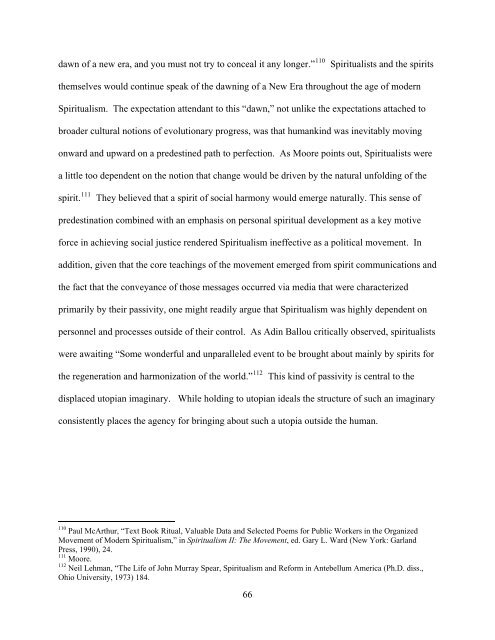A Genealogy of the Extraterrestrial in American Culture
A Genealogy of the Extraterrestrial in American Culture
A Genealogy of the Extraterrestrial in American Culture
You also want an ePaper? Increase the reach of your titles
YUMPU automatically turns print PDFs into web optimized ePapers that Google loves.
dawn <strong>of</strong> a new era, and you must not try to conceal it any longer.” 110<br />
Spiritualists and <strong>the</strong> spirits<br />
<strong>the</strong>mselves would cont<strong>in</strong>ue speak <strong>of</strong> <strong>the</strong> dawn<strong>in</strong>g <strong>of</strong> a New Era throughout <strong>the</strong> age <strong>of</strong> modern<br />
Spiritualism. The expectation attendant to this “dawn,” not unlike <strong>the</strong> expectations attached to<br />
broader cultural notions <strong>of</strong> evolutionary progress, was that humank<strong>in</strong>d was <strong>in</strong>evitably mov<strong>in</strong>g<br />
onward and upward on a predest<strong>in</strong>ed path to perfection. As Moore po<strong>in</strong>ts out, Spiritualists were<br />
a little too dependent on <strong>the</strong> notion that change would be driven by <strong>the</strong> natural unfold<strong>in</strong>g <strong>of</strong> <strong>the</strong><br />
spirit. 111<br />
They believed that a spirit <strong>of</strong> social harmony would emerge naturally. This sense <strong>of</strong><br />
predest<strong>in</strong>ation comb<strong>in</strong>ed with an emphasis on personal spiritual development as a key motive<br />
force <strong>in</strong> achiev<strong>in</strong>g social justice rendered Spiritualism <strong>in</strong>effective as a political movement. In<br />
addition, given that <strong>the</strong> core teach<strong>in</strong>gs <strong>of</strong> <strong>the</strong> movement emerged from spirit communications and<br />
<strong>the</strong> fact that <strong>the</strong> conveyance <strong>of</strong> those messages occurred via media that were characterized<br />
primarily by <strong>the</strong>ir passivity, one might readily argue that Spiritualism was highly dependent on<br />
personnel and processes outside <strong>of</strong> <strong>the</strong>ir control. As Ad<strong>in</strong> Ballou critically observed, spiritualists<br />
were await<strong>in</strong>g “Some wonderful and unparalleled event to be brought about ma<strong>in</strong>ly by spirits for<br />
<strong>the</strong> regeneration and harmonization <strong>of</strong> <strong>the</strong> world.” 112<br />
This k<strong>in</strong>d <strong>of</strong> passivity is central to <strong>the</strong><br />
displaced utopian imag<strong>in</strong>ary. While hold<strong>in</strong>g to utopian ideals <strong>the</strong> structure <strong>of</strong> such an imag<strong>in</strong>ary<br />
consistently places <strong>the</strong> agency for br<strong>in</strong>g<strong>in</strong>g about such a utopia outside <strong>the</strong> human.<br />
110 Paul McArthur, “Text Book Ritual, Valuable Data and Selected Poems for Public Workers <strong>in</strong> <strong>the</strong> Organized<br />
Movement <strong>of</strong> Modern Spiritualism,” <strong>in</strong> Spiritualism II: The Movement, ed. Gary L. Ward (New York: Garland<br />
Press, 1990), 24.<br />
111 Moore.<br />
112 Neil Lehman, “The Life <strong>of</strong> John Murray Spear, Spiritualism and Reform <strong>in</strong> Antebellum America (Ph.D. diss.,<br />
Ohio University, 1973) 184.<br />
66















